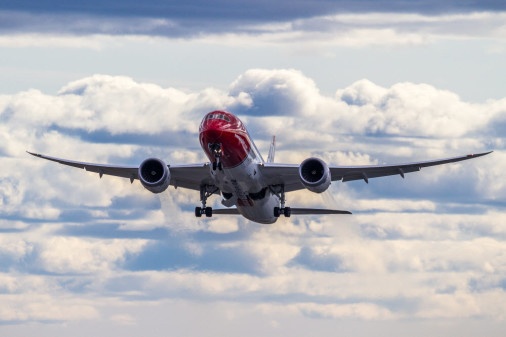In a bid to generate cash, Norwegian Air Shuttle (NAS) requested extend the maturity dates of its two unsecured bonds in exchange of a security package backed by the take-off and landing slots at London Gatwick Airport. Norwegian’s Gatwick slot portfolio is valued in excess of the current nominal bond value for NAS07 and NAS08 of $380 million.
NAS has been seeking an extension for NAS07 and NAS08 to November 2021 and February 2022, respectively. The unsecured bondholders are being offered a security package consisting of a pledge over all shares in Norwegian Air Norway (NAN), which will hold the slots.
Unfortunately the landing slot sweetener wasn’t enough for bondholders, who are on track to reject the deal. The final notice will be given on September 16 but the intitial indications are that the airline will fail to receive majority ascent to the extension.
DNB Markets, a part of DNB Bank, and Pareto Securities, are financial advisers for NAS, while BAHR and Wikborg Rein are legal advisers.
The two-year extension in these bond repayments was badly needed since it would have provided a much-needed lifeline for the troubled carrier, which although it states it is on track to reach NOK 6-7 billion in EBITDAR in 2019, with further improvement expected next year, staking such lucrative slots to extend these bonds speaks volumes about its current financial strength.
NAS also claims to be on track to reach the targeted NOK 2,000 million cost reduction for 2019, with further cost improvements expected in 2020 and 2021
NAS has also recently sold its 17.5% shareholding in banking company Norwegian Finans (NOFI) for NOK 2,218 million (approximately $246.7 million) to Cidron Xingu, with the net proceeds of NOK 934 million to be received by the end of the year that will strengthen the airline’s balance sheet and liquidity.
In a statement, Geir Karlsen, acting chief executive of Norwegian, said: “The sale of the [Norwegian Finans] shares is part of Norwegian’s strategy to strengthen our core airline operations and focusing on the transition from growth to profitability. The cooperation between the airline and the bank has been a great success in the Nordic region for many years and will continue without the airline holding any shares in NOFI.”
The airline has also confirmed that negotiations regarding the establishment of the joint venture for a part of the aircraft fleet are “progressing and will be announced when concluded”.
In 2019, Norwegian has sold aircraft with proceeds net of debt repayment of $127 million. However, NAS states that any further divestment is now on hold until the Boeing 737 MAX is back in operation. NAS has further confirmed that ongoing discussions with lessors with the goal to defer payment schedules are continuing, adding that discussions with aircraft and engine manufacturers are also ongoing, “all with the goal of significant liquidity ease”.
NAS working capital has been negatively affected by the Rolls-Royce engines issues and the grounding of the MAX fleet by approximately NOK 1.5 billion, and that the amount not received from credit card acquirers has negatively affected working capital by approximately NOK 4 billion (approximately $439 million). The airline says that it is working to shorten the working capital cycle through new payment technologies and further capacity. That may be so but this latest setback has effectively wiped out the cash generated by the NOFI sale hence the bond restructuring offer. If that fails, as predicted, the airline may seek some debt-to-equity conversion or another capital call to stay afloat.

